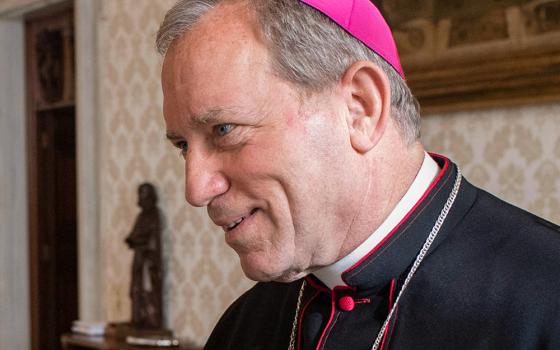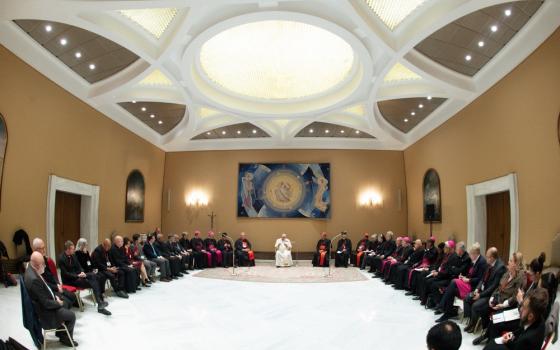It wasn't all that long ago that Michael Gordon was wondering where his life was headed. He had served time in prison on illegal drug charges and this time after his release at 35 years old, life on the streets was not very appealing.
He made his way to the Healing Place in Richmond, Va., about 75 miles from his hometown of Portsmouth, Va., to overcome his addiction. Soon afterward, he was introduced to a transitional housing program operated by Boaz and Ruth, a Catholic Campaign for Human Development grantee which oversees a series of social enterprises working with hard-to-employ people.
Gordon, now 41, said turning to the agency in Richmond's economically stressed Highland Park neighborhood was the best thing he could have done.
Completing Boaz and Ruth's intensive highly individualized program, Gordon became warehouse and procurement manager for a furniture bank run by Caritas, an agency providing services to the homeless that is based in Highland Park. Gordon told Catholic News Service his life is a far cry from what it was. He has stability, a good job and a place to call home. And life with his wife, daughter and two grandchildren is fulfilling.
"At 35 years old, I had to say to myself, 'Is this all I'm going to be?' Even though I had the capabilities of doing something else, it just didn't work out. I remember being the guy begging for change. I remember sleeping in the shade or anywhere I could because I disconnected from my family," Gordon said.
Boaz and Ruth is one of numerous innovative poverty-fighting programs that have sprouted around the country in the decades since President Lyndon B. Johnson issued his call for a "war on poverty" in his 1964 State of the Union address.
Megan Rollins, president and CEO at Boaz and Ruth, said the program Gordon completed was designed specifically for ex-offenders, those who have completed prison terms and want to fit into society.
"We've got to get past this idea that someone must be continually paying for his crime," she said.
Other programs have embraced creative and sustainable alternatives to breach the poverty divide: the Transformative Art Center at the Bishop Cosgrove Center run by Catholic Charities of the Diocese of Cleveland allowed individuals to find support through creative efforts; a worker-owned sewing cooperative in North Carolina; a community land trust in Seattle that opened the door to home ownership for moderate-income families and individuals.
CCHD, the U.S. bishops' domestic anti-poverty initiative, has supported the North Carolina and Seattle programs through special economic development grants.
Likewise, Catholic Charities USA has spearheaded flexible new programs often geared toward individual needs. Father Larry Snyder, the agency's president, told CNS that the innovative programs that evolved in the 1960s worked to reduce poverty from 19 percent, when Johnson issued his call, to 15 percent today.
The rate had dropped to 11 percent in 1973, but several deep recessions caused the rate to rise, especially since 2007.
To keep the interest in reducing poverty high, Catholic Charities brought together Feeding America, Save the Children, the Salvation Army, the National Alliance to End Homelessness, Lutheran Services in America, United Way, and the Alliance for Children and Families to work in 2014 to educate, innovate and act to reduce poverty.
"We're saying as critical as these programs are as part of the safety net, we have to look at 2014 and say, 'Is there a better way, a more effective way?' We think we can improve upon what these programs have done," he said.
Along that line of thinking, Catholic Charities of West Tennessee in the Diocese of Memphis introduced the St. Sebastian Veterans Service Program in October. Gene Hill, 50, a formerly homeless Army veteran, is one of its first beneficiaries.
Working with a case manager, Hill designed a step-by-step program for himself that quickly took him off the street. He found work as a driver for a veterans' service agency and on Jan. 15 landed an interview Federal Express, he said.
Mike Allen, president and CEO of the Catholic Charities agency, said the program is aimed at helping veterans and their families who are facing homelessness or the threat of losing their home. He explained that the need for such services is particularly high among young veterans -- men and women alike -- who served in Iraq or Afghanistan.
"Employment is a big part of the self-sustainability," Allen said. "It's clear that there's mental health concerns too, whether post-traumatic stress syndrome or something else, so we're also helping them access the benefits they are eligible for."
In Morganton, N.C., in the heart of the state's once thriving garment industry, Walter Vicente joined the worker-owner Opportunity Threads three years ago. He since has become one of 14 partners in the company, which contracts with entrepreneurs, start-up companies and other firms to produce apparel, handbags and other items.
Vicente, 32, told CNS he learned to sew as a child with his family in his native Guatemala and wanted to use those skills again. Working at a low-wage job in a convenience store "was pretty tough," the father of four said.
"I like being here (as a partner). I can see a better future," he said, adding he is now able to see the day when his children, ages 1 through 8, can attend college.
Molly Hemstreet, who started Opportunity Threads with her husband, a union organizer, said the company's model is one that can change the way business is conducted because it is owned by people vested in the community.
"People see themselves in the long haul and that's what we want to address, generational poverty where people can see themselves in long-term solutions," Hemstreet explained.
Across the country in Seattle, Sarah Sausner never thought she could afford a home, especially because she worked in the nonprofit sector and earned a modest income. But through the Homestead Community Land Trust, she came up with a down payment and can budget the monthly mortgage on her 900-square-foot home in the city's convenient Beacon Hill neighborhood.
"Homestead is a kind of game changer for modest income people that usually doesn't exist in the city. It's not just a win for one family, but for the neighborhood," said Sausner, 33, who works in a county-run health care program serving homeless people.
Sheldon Cooper, Homestead's executive director, said the trust lets homeowners realize a constant 1.5 percent annual appreciation in home value, avoiding violent market swings. Homestead has 162 homes in its portfolio and plans to add 20 to 40 more annually for the foreseeable future.
"We focus on long-term affordability of the home," he explained. "We offer good high quality homes at substantial discounts from market prices. In exchange those buyers agree to restrictions on their future sales price for the benefit of insuring that another buyer in the same situation can afford to buy it from them."




